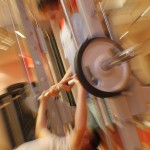 Make the most of every minute spent in the gym by cranking up the intensity of your workout. Here are a few ideas to get your started. (The following is for intermediate or advanced exercisers without injury.)
Make the most of every minute spent in the gym by cranking up the intensity of your workout. Here are a few ideas to get your started. (The following is for intermediate or advanced exercisers without injury.)
Work in a shorter range of motion. When performing a motion, stop where you feel the most tension in your muscle, and then work your range of motion around that angle eliminating the full bending and straightening of your joint. For example, when lowering into a squat stop when your thighs are parallel to the floor, and then push up only about two inches before lowering back to the parallel to the floor position. Only return to your straight leg upright position every third or fourth rep.
Add in cardio-bursts. Take a few minutes at regular intervals during your cardio workout and double up the intensity into a sprint. For example, every three minutes perform a high speed sprint interval lasting from twenty seconds to one minute. Keeping the cadence high and piling on the resistance for a muscle overload for twenty to thirty seconds will also serve as a cardio burst.
Do back to back exercises. Choosing two or more moves for the same muscle group or movement pattern together without rest will improve difficulty due to a reduced rest cycle. For example do a set of cable pulldowns, immediately followed by a standing dumbbell row, immediately followed by a free-weight single arm row. Do ten to twelve reps each, followed by a thirty second rest. Then repeat the two or three moves until all sets are complete.
Increase your weights to lift with heft. Adding weight will increase the overload on our muscles to promote strength results. Try adding an extra plate of weight or choosing the next set of dumbbells for one set or several sets, then decrease reps if needed. Be sure to keep your movement pace under control and safe, being mindful of posture and stability.
Slow down your reps. Increasing the time muscles are kept under tension will fire up muscular endurance. Pay attention to continue breathing at your normal rate and keep your stabilizing muscles engaged so only the goal muscles are working.
 Subscribe
Subscribe







